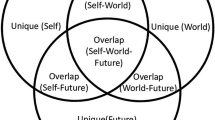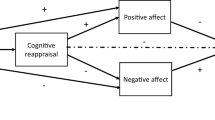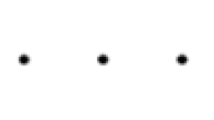Abstract
According to the hopelessness theory of depression, some individuals have a cognitive vulnerability (i.e., negative cognitive style) that interacts with stressful life events to produce depression. A negative cognitive style is associated with a maladaptive cognitive response to stress (i.e., increased negative attributions); however, no study has assessed whether this cognitive vulnerability is also associated with a maladaptive endocrine (e.g., cortisol) response to stress. If shown to be related, individual differences in cognitive style may potentially explain why the literature on the association between cortisol stress reactivity and depression is mixed, as cortisol responses to stress may vary as a function of attributional style. The aim of the present study was to provide a preliminary test of whether cognitive vulnerability was related to cortisol reactivity to an acute laboratory stressor among a sample of young adults (n = 20; Mage = 23.1 years; 10 females). Negative cognitive style and depressive symptoms were assessed via the Cognitive Style Questionnaire and the Patient Health Questionnaire, respectively. All participants also completed the Trier Social Stress Test (TSST). Salivary cortisol was collected before, during, and after the TSST. Results showed a significant association between negative cognitive style and cortisol stress reactivity, such that a greater negative cognitive style was related to a larger cortisol response to the TSST. Post hoc analyses revealed that this association was moderated by gender (i.e., effect observed in males only). Cortisol responses to the TSST, in general, were lower among females, but this relationship was not moderated by cognitive style. These findings may be related to underlying gender differences in stress vulnerability, which may have clinical implications for understanding the interactive effect of cognitive and neuroendocrine processes on vulnerability and resiliency to depression.

Similar content being viewed by others
References
Abelson, J. L., Khan, S., Liberzon, I., Erickson, T. M., & Young, E. A. (2008). Effects of perceived control and cognitive coping on endocrine stress responses to pharmacological activation. Biological Psychiatry, 64(8), 701–707. https://doi.org/10.1016/j.biopsych.2008.05.007.
Abramson, L. Y., Metalsky, G. I., & Alloy, L. B. (1989). Hopelessness depression: a theory-based subtype of depression. Psychological Review, 96(2), 358–372. https://doi.org/10.1037/0033-295X.96.2.358.
Abramson, L. Y., Alloy, L. B., Hogan, M. E., Whitehouse, W. G., Donovan, P., Rose, D. T., et al. (1999). Cognitive vulnerability to depression: theory and evidence. Journal of Cognitive Psychotherapy, 13(1), 5–20 Retrieved from http://www.ingentaconnect.com/content/springer/jcogp/1999/00000013/00000001/art00002.
Alloy, L. B., Abramson, L. Y., Whitehouse, W. G., Hogan, M. E., Panzarella, C., & Rose, D. T. (2006). Prospective incidence of first onsets and recurrences of depression in individuals at high and low cognitive risk for depression. Journal of Abnormal Psychology, 115(1), 145–156. https://doi.org/10.1016/j.jad.2006.02.012.
Burke, H., Davis, M., Otte, C., & Mohr, D. (2005). Depression and cortisol responses to psychological stress: a meta-analysis. Psychoneuroendocrinology, 30, 846–856 Retrieved from http://www.sciencedirect.com/science/article/pii/S0306453005000831.
Daniels, K., Daugherty, J. D., & Mosher, W. D. (2015). Current contraceptive use and variation by selected characteristics among women aged 15-44:United States, 2011-2013.
de Kloet, E. R. (1991). Brain corticosteroid receptor balance and homeostatic control. Frontiers in Neuroendocrinology, 12(2), 95–164. https://doi.org/10.1080/09614520701469617.
Fife, D. A., Mendoza, J. L., & Terry, R. (2012). The assessment of reliability under range restriction: a comparison of α, ω, and test-retest reliability for dichotomous data. Educational and Psychological Measurement, 72(5), 862–888. https://doi.org/10.1177/0013164411430225
Gaab, J., Blättler, N., Menzi, T., Pabst, B., Stoyer, S., & Ehlert, U. (2003). Randomized controlled evaluation of the effects of cognitive-behavioral stress management on cortisol responses to acute stress in healthy subjects. Psychoneuroendocrinology, 28(6), 767–779. https://doi.org/10.1016/S0306-4530(02)00069-0.
Gibb, B. E., Beevers, C. G., Andover, M. S., & Holleran, K. (2006). The hopelessness theory of depression: a prospective multi-wave test of the vulnerability-stress hypothesis. Cognitive Therapy and Research, 30(6), 763–772. https://doi.org/10.1007/s10608-006-9082-1.
Green, P., & Macleod, C. J. (2016). SIMR: an R package for power analysis of generalized linear mixed models by simulation. Methods in Ecology and Evolution, 7(4), 493–498. https://doi.org/10.1111/2041-210X.12504.
Greenberg, P. E., Fournier, A.-A., Sisitsky, T., Pike, C. T., & Kessler, R. C. (2015). The economic burden of adults with major depressive disorder in the United States (2005 and 2010). The Journal of Clinical Psychiatry, 76(2), 155–162. https://doi.org/10.4088/JCP.14 m09298.
Gunnar, M., & Quevedo, K. (2007). The neurobiology of stress and development. Annual Review of Psychology, 58, 145–173. https://doi.org/10.1146/annurev.psych.58.110405.085605.
Haeffel, G. J., & Grigorenko, E. L. (2007). Cognitive vulnerability to depression: exploring risk and resilience. Child and Adolescent Psychiatric Clinics of North America, 16(2), 435–448. https://doi.org/10.1016/j.chc.2006.11.005.
Haeffel, G. J., & Vargas, I. (2011). Resilience to depressive symptoms: the buffering effects of enhancing cognitive style and positive life events. Journal of Behavior Therapy and Experimental Psychiatry, 42(1), 13–18. https://doi.org/10.1016/j.jbtep.2010.09.003.
Haeffel, G. J., Abramson, L. Y., Metalsky, G. I., Dykman, B. M., Donovan, P., Hogan, M. E., et al. (2005). Negative cognitive styles, dysfunctional attitudes, and the remitted depression paradigm: a search for the elusive cognitive vulnerability to depression factor among remitted depressives. Emotion, 5(3), 343–348. https://doi.org/10.1037/1528-3542.5.3.343.
Haeffel, G. J., Gibb, B. E., Metalsky, G. I., Alloy, L. B., Abramson, L. Y., Hankin, B. L., et al. (2008). Measuring cognitive vulnerability to depression: development and validation of the cognitive style questionnaire. Clinical Psychology Review, 28(5), 824–836. https://doi.org/10.1016/j.cpr.2007.12.001.
Hankin, B. L., Abramson, L. Y., Miller, N., & Haeffel, G. J. (2004). Cognitive vulnerability-stress theories of depression: examining affective specificity in the prediction of depression versus anxiety in three prospective studies. Cognitive Therapy and Research, 28(3), 309–345. https://doi.org/10.1023/B:COTR.0000031805.60529.0d.
Johnson, E., Kamilaris, T., Chrousos, G., & Gold, P. (1992). Mechanisms of stress: a dynamic overview of hormonal and behavioral homeostasis. Neuroscience and Biobehavioral Reviews, 16(1), 115–130 Retrieved from http://www.sciencedirect.com/science/article/pii/S0149763405801757.
Kirschbaum, C., Wüst, S., & Hellhammer, D. (1992). Consistent sex differences in cortisol responses to psychological stress. Psychosomatic Medicine, 54(6), 648–657 Retrieved from http://www.ncbi.nlm.nih.gov/pubmed/1454958.
Kirschbaum, C., Pirke, K. M., & Hellhammer, D. H. (1993). The ‘Trier Social Stress Test’—a tool for investigating psychobiological stress responses in a laboratory setting. Neuropsychobiology. https://doi.org/10.1159/000119004.
Kirschbaum, C., Kudielka, B. M., Gaab, J., Schommer, N. C., & Hellhammer, D. H. (1999). Impact of gender, menstrual cycle phase, and oral contraceptives on the activity of the hypothalamus-pituitary-adrenal axis. Psychosomatic Medicine, 61(2), 154–162.
Kroenke, K., Spitzer, R. L., & Williams, J. B. W. W. (2001). The PHQ-9: validity of a brief depression severity measure. Journal of General Internal Medicine, 16(9), 605–613. https://doi.org/10.1046/j.1525-1497.2001.016009606.x.
Kudielka, B. M., & Kirschbaum, C. (2005). Sex differences in HPA axis responses to stress: a review. Biological Psychology, 69(1), 113–132. https://doi.org/10.1016/j.biopsycho.2004.11.009.
Kudielka, B. M., Buske-Kirschbaum, A., Hellhammer, D. H., & Kirschbaum, C. (2004a). HPA axis responses to laboratory psychosocial stress in healthy elderly adults, younger adults, and children: impact of age and gender. Psychoneuroendocrinology, 29, 83–98 Retrieved from http://www.sciencedirect.com/science/article/pii/S0306453002001464.
Kudielka, B. M., Schommer, N., Hellhammer, D. H., & Kirschbaum, C. (2004b). Acute HPA axis responses, heart rate, and mood changes to psychosocial stress (TSST) in humans at different times of day. Psychoneuroendocrinology, 29, 983–992 Retrieved from http://www.sciencedirect.com/science/article/pii/S030645300300180X.
Kudielka, B. M., Hellhammer, D. H., & Kirschbaum, C. (2007). Ten years of research with the Trier Social Stress Test—revisited. In E. Harmon-Jones & P. Winkielman (Eds.), Social Neuroscience: Integrating biological and psychological explanations of social behavior (pp. 56–83). New York: The Guilford Press Retrieved from https://books.google.com/books?hl=en&lr=&id=mKSqxaHGaicC&oi=fnd&pg=PA56&dq=(Kudielka,+Hellhammer,+Kirschbaum,+2007)&ots=6UP9dn-rIa&sig=CDI37Nlm-jGt7d-tvKY92NxjbFQ.
Lopez-Duran, N. L., Mayer, S. E., & Abelson, J. L. (2014). Modeling neuroendocrine stress reactivity in salivary cortisol: adjusting for peak latency variability. Stress. https://doi.org/10.3109/10253890.2014.915517.
Lopez-Duran, N. L., McGinnis, E., Kuhlman, K., Geiss, E., Vargas, I., & Mayer, S. (2015). HPA-axis stress reactivity in youth depression: evidence of impaired regulatory processes in depressed boys. Stress, 18(5), 1–9. https://doi.org/10.3109/10253890.2015.1053455.
Mac Giollabhui, N., Hamilton, J. L., Nielsen, J., Connolly, S. L., Stange, J. P., Varga, S., et al. (2018). Negative cognitive style interacts with negative life events to predict first onset of a major depressive episode in adolescence via hopelessness. Journal of Abnormal Psychology, 127(1), 1–11. https://doi.org/10.1037/abn0000301.
Mazurka, R., Wynne-Edwards, K. E., & Harkness, K. L. (2018). Sex differences in the cortisol response to the Trier Social Stress Test in depressed and nondepressed adolescents. Clinical Psychological Science, 6(3), 301–314. https://doi.org/10.1177/2167702617739973.
Merikangas, K. R., Ames, M., Cui, L., Stang, P. E., Ustun, T. B., Von Korff, M., & Kessler, R. C. (2007). The impact of comorbidity of mental and physical conditions on role disability in the US adult household population. Archives of General Psychiatry, 64(10), 1180–1188. https://doi.org/10.1001/archpsyc.64.10.1180.
Metalsky, G. I., & Joiner, T. E. J. (1992). Vulnerability to depressive symptomatology: a prospective test of the diathesis-stress and causal mediation components of the hopelessness theory of depression. Journal of Personality and Social Psychology, 63(4), 667–675. https://doi.org/10.1037/0022-3514.63.4.667.
Metalsky, G. I., Halberstadt, L. J., & Abramson, L. Y. (1987). Vulnerability to depressive mood reactions: toward a more powerful test of the diathesis-stress and causal mediation components of the reformulated theory of depression. Journal of Personality and Social Psychology, 52(2), 386–393. https://doi.org/10.1037/0022-3514.52.2.386.
Monroe, S. M., & Harkness, K. L. (2005). Life stress, the “kindling” hypothesis, and the recurrence of depression: considerations from a life stress perspective. Psychological Review, 112(2), 417–445. https://doi.org/10.1037/0033-295X.112.2.417.
Monroe, S. M., & Simons, A. D. (1991). Diathesis stress theories in the context of life stress research—implications for the depressive-disorders. Psychological Bulletin, 110(3), 406–425. https://doi.org/10.1037//0033-2909.110.3.406.
Schlotz, W., Hammerfald, K., Ehlert, U., & Gaab, J. (2011). Individual differences in the cortisol response to stress in young healthy men: testing the roles of perceived stress reactivity and threat appraisal using multiphase latent growth curve modeling. Biological Psychology, 87(2), 257–264. https://doi.org/10.1016/j.biopsycho.2011.03.005.
Shapero, B. G., McClung, G., Bangasser, D. A., Abramson, L. Y., & Alloy, L. B. (2017). Interaction of biological stress recovery and cognitive vulnerability for depression in adolescence. Journal of Youth and Adolescence, 46(1), 91–103. https://doi.org/10.1007/s10964-016-0451-0.
Shull, A., Mayer, S. E., McGinnis, E., Geiss, E., Vargas, I., & Lopez-Duran, N. L. (2016). Trait and state rumination interact to prolong cortisol activation to psychosocial stress in females. Psychoneuroendocrinology, 74, 324–332. https://doi.org/10.1016/j.psyneuen.2016.09.004.
Southwick, S. M., Vythilingam, M., & Charney, D. S. (2005). The psychobiology of depression and resilience to stress: implications for prevention and treatment. Annual Review of Clinical Psychology, 1, 255–291. https://doi.org/10.1146/annurev.clinpsy.1.102803.143948.
Stroud, L. R., Salovey, P., & Epel, E. S. (2002). Sex differences in stress responses: social rejection versus achievement stress. Biological Psychiatry, 52(4), 318–327. https://doi.org/10.1016/S0006-3223(02)01333-1.
Tsigos, C., & Chrousos, G. P. (2002). Hypothalamic-pituitary-adrenal axis, neuroendocrine factors and stress. Journal of Psychosomatic Research, 53(4), 865–871. https://doi.org/10.1016/S0022-3999(02)00429-4.
Vargas, I., & Lopez-Duran, N. (2017). Investigating the effect of acute sleep deprivation on hypothalamic-pituitary-adrenal-axis response to a psychosocial stressor. Psychoneuroendocrinology, 79, 1–8. https://doi.org/10.1016/j.psyneuen.2017.01.030.
Williams, L. S., Brizendine, E. J., Plue, L., Bakas, T., Tu, W., Hendrie, H., & Kroenke, K. (2005). Performance of the PHQ-9 as a screening tool for depression after stroke. Stroke, 36(3), 635–638. https://doi.org/10.1161/01.STR.0000155688.18207.33.
Acknowledgment
The authors would like to thank the Michigan Psychoneuroendocrinology Affective Laboratory staff, particularly Andrew Garton, Rebecca Mulder, Tonia Ballantyne, Lara Fawaz, Allie Hammond, and Rachel Cannon who assisted in data collection.
Funding
The funding for this research was provided by the University of Michigan, Department of Psychology, University of Michigan Rackham Graduate School, Blue Cross Blue Shield of Michigan Foundation, and the American Psychological Association of Graduate Students.
Author information
Authors and Affiliations
Corresponding author
Ethics declarations
The Institutional Review Board at the University of Michigan approved the study, and participants signed a written informed consent.
Conflict of interest
The authors declare that they have no conflict of interest.
Disclaimer
The funding source had no role in the study design, data collection, analyses, or manuscript preparation.
Additional information
Publisher’s Note
Springer Nature remains neutral with regard to jurisdictional claims in published maps and institutional affiliations.
Rights and permissions
About this article
Cite this article
Vargas, I., Haeffel, G.J., Jacobucci, R. et al. Negative Cognitive Style and Cortisol Reactivity to a Laboratory Stressor: a Preliminary Study. J Cogn Ther 13, 1–14 (2020). https://doi.org/10.1007/s41811-019-00052-8
Published:
Issue Date:
DOI: https://doi.org/10.1007/s41811-019-00052-8




